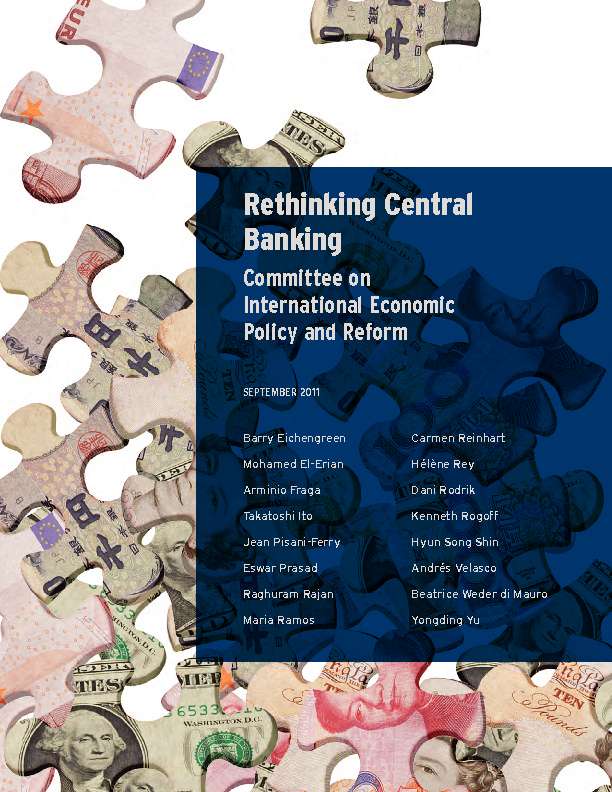External Publication
Rethinking central banking
This report lays out a framework for rethinking central banking in light of lessons learned in the lead-up to and aftermath of the global financial crisis. By the early 2000s, a growing number of central banks, in advanced countries and emerging markets alike, had converged on a policy framework, flexible inflation targeting, which seemed capable […]
This report lays out a framework for rethinking central banking in light of lessons learned in the lead-up to and aftermath of the global financial crisis.
By the early 2000s, a growing number of central banks, in advanced countries and emerging markets alike, had converged on a policy framework, flexible inflation targeting, which seemed capable of achieving price stability and delivering macroeconomic stability at the national and international levels. This framework had many practical achievements, including bringing price stability to many emerging markets. Now, however, there is growing recognition that the conventional approach to central banking needs to be rethought.The relationship between price stability and the broader goals of macroeconomic and financial stability clearly needs to be redefined. Moreover, the evolution of monetary and exchange rate regimes has resulted in incompatibilities among the policies of some key countries. Central banks are also being pulled into new roles by the post-crisis environment, which features high levels of public and private debt in advanced economies and concerns about capital inflows and currency appreciation in emerging markets. While some aspects of these roles are not new, they are risky, as central bank actions can inflict collateral damage on domestic financial systems and have the potential of raising new domestic and international tensions.
The report analyzes these issues from academic and practical policy-oriented perspectives. Drawing on this analysis, it recommends changes to the dominant framework guiding central banking practice.
The first recommendation is that central banks should go beyond their traditional emphasis on low inflation to adopt an explicit goal of financial stability. Macroprudential tools should be used alongside monetary policy in pursuit of that objective. Mechanisms should also be developed to encourage large-country central banks to internalize the spillover effects of their policies. Specifically, we call for the creation of an International Monetary Policy Committee composed of representatives of major central banks that will report regularly to world leaders on the aggregate consequences of individual central bank policies.
There is substantial pressure on central banks to acknowledge the importance of still other issues, such as the high costs of public debt management and the level of the exchange rate. Central banks are more likely to safeguard their independence and credibility by acknowledging and explicitly addressing the tensions between inflation targeting and competing objectives than by denying such linkages and proceeding with business as usual. Central banks should make clear that monetary policy is only one part of the policy response and cannot be effective unless other policies—fiscal and structural policies, financial sector regulation—work in tandem.








